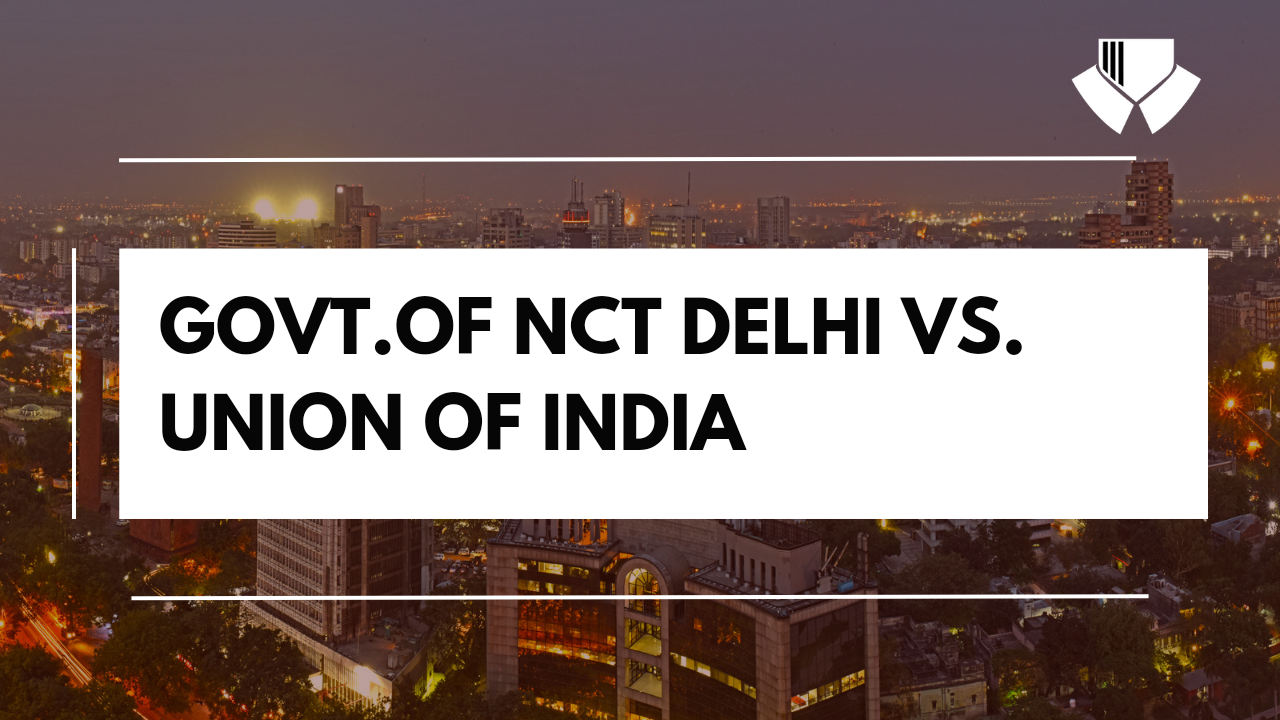This case analysis is done by Sagili Bhavana Sree, A 2nd year law student at Damodaram Sanjivayya National University.
Citation- [C. A. No. 2357 of 2017]
Name of the court judges- D. Y. Chandrachud and Ashok Bhushan
FACTS
- A writ petition was submitted on the authority and management options available to an elected NCTD government. According to Article 239 of the Indian Constitution, a Union Territory is managed by an Administrator that the President of India appoints with the proper title. Such a title might be anything like Administrator or Lieutenant Governor. The role of lieutenant governor in Delhi has already been chosen.
- The Delhi High Court ruled that because the NCTD is a Union Territory, the President retains authority over both the NCTD and the Union Territory. The Central Government and its candidate, the Lieutenant Governor, are in charge of the latter. Both have abilities that overlap. When the Apex Court’s Division Bench considered these appeals, it found that the questions addressed were of fundamental constitutional significance and that they required to be referred to a Constitution Bench under Article 143’s Clause 5(5)..
ISSUE
1) Whether the Government of NCTD or the Lieutenant Governor has legislative & executive control over Entry 41 mentioned under list II of the seventh schedule of the Constitution?
CONTENTIONS
PETITIONERS
- A Lieutenant Governor is not a Viceroy. He is the President’s agent, and his authority is totally defined by the President’s preferences. According to the State List entries, the inhabitants of Delhi had the authority to elect their own legislature and administration, as well as create and enforce laws.
- Article 239 A creates the core of representative democracy by separating the executive and legislative branches of government. As a result, the legislature should have complete control over law enforcement, and no other authority should be able to interfere with this vital function.
- The Governor’s influence slowed and effectively paralyzed the government. He demands input on every topic and refuses to accept official decisions made without consulting the administration. The Lieutenant Governor of Delhi should serve more as a ceremonial figurehead than an actual head of state.
- Delhi has a responsible government as opposed to a representative government. The LG has no power over the affairs of Delhi. This authority is only held by the Council of Ministers. The LG may meddle in Delhi’s activities only in two cases:
1)When Delhi is threatened or when it exceeds its jurisdiction.
2) If the LG and the Council of Ministers disagree, it should be resolved through negotiation first and then reported to the President if no resolution is reached. Because it is elected by the people, the government’s position is unfettered.
RESPONDENTS
- The response argued that the President remained in charge despite the addition of Article 239 AA. The legislative power is unaffected by the addition of Article 239 AA to the Indian Constitution because the President functions through the Lieutenant Governor. •Examples of central law include the DANICS Act of 2003 and the Delhi Fire Services Act of 2007, which are only engaged in municipal governance. In a variety of circumstances, such as those involving public order, law enforcement, and land disputes, the LG has the power to defy the Council of Ministers. Delhi, a Union Territory, has a head of state who is the President acting through the LG.
- The Union of India also has a government that was chosen democratically. They are better because the Indian people chose to elect them. Delhi is not a state despite its unique status. It is a Union Territory, hence despite having a legislative assembly, it answers to the President of India. Declaring that the Union of India and the Delhi Legislative Assembly have the same jurisdiction would be undemocratic because Delhi is not included in the list of states. Additionally, he claimed that Article 239 AA violated the constitution. Daily needs are governed by the legislative branch, while the President and the Center are in charge of the administrative branch.
JUDGMENT
- The Supreme Court mandated that the Delhi Lieutenant Governor abide by the advice and recommendations of the chief minister-led council of ministers of the Delhi Government on all matters that the Delhi Legislative Assembly could legislate on, i.e., all items on the State List and the Concurrent List aside from political matters, even though the government was required to notify him or her of its decisions. The court further declared that the LG had to abide by the president’s directives with regard to the aforementioned issues.
- In the event of a dispute, the president would be the final arbiter, and the president’s decision would be binding on both the lieutenant governor and the Delhi government. The president is subject to the help and counsel of the prime minister-headed Union Council of Ministers. The court advised the lieutenant governor to exercise this authority only in extraordinary situations. The court did not, however, define what “trivial” differences of opinion entailed.
- The court went on to state that “absolutism and anarchism alike have no place” in the management of the National Capital Territory of Delhi. At the same time, the supreme court ruled that, despite having a special status, Delhi was not a state. As a result, unlike state governors, Delhi’s lieutenant governor also carried the title of administrator in addition to his or her role as a simple constitutional figurehead.
CONCLUSION
The Supreme Court of India emphasized the importance of ensuring that state governance is not taken over by the central government while delivering a critical verdict confirming that control over administrative services in the national capital – with the exception of those related to public order, police, and land – belonged to the government of the national capital.


